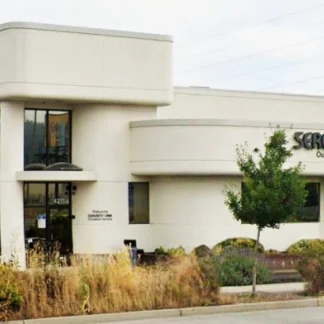Willamette Family - Buckley Center
Buckley Center is part of the Willamette Family, a collection of rehab centers i...
Serenity Lane is located in Eugene, Oregon. Serenity Lane is a specialty treatment facility for the disease of addiction offering a 10 week outpatient program and a full year of recovery support. Extended, long-term care for relapse-prone adults.
Contact us for more information: (541) 485-1577

Connect with Serenity Lane by calling their admissions team directly.
(541) 485-1577 Website Get DirectionsThe Commission on Accreditation of Rehabilitation Facilities (CARF) is a non-profit organization that specifically accredits rehab organizations. Founded in 1966, CARF's, mission is to help service providers like rehab facilities maintain high standards of care.
CARF Accreditation: Yes
Serenity Lane's nationally recognized Family Program is an educational program that focuses on repairing relationships damaged by years of destructive chemical dependency. Their program is designed to integrate the patient and the family and to supply vital information about how this disease negatively impacts the family system. The Family Program is offered in a 4-weekend series. Attending all the sessions is highly recommended. This program is an integral part of Serenity Lane's Residential Treatment.
Each counselor has a number of patients, who together, form a group. On weekdays, the group will meet each morning and afternoon to explore problems, feelings, changes and conflicts that come up in the treatment process. This is called group therapy and it is a significant part of residential treatment. Patients will be oriented to group and assigned a "buddy" (another patient who is further along in treatment). This person will help explain the rules and ease transition into the group environment.
In individual therapy, a patient meets one-on-one with a trained psychologist or counselor. Therapy is a pivotal part of effective substance abuse treatment, as it often covers root causes of addiction, including challenges faced by the patient in their social, family, and work/school life.
Nicotine Replacement Therapy (NRT) is a way of getting nicotine into the bloodstream without smoking. It uses products that supply low doses of nicotine to help people stop smoking. The goal of therapy is to cut down on cravings for nicotine and ease the symptoms of nicotine withdrawal.
Each counselor has a number of patients, who together, form a group. On weekdays, the group will meet each morning and afternoon to explore problems, feelings, changes and conflicts that come up in the treatment process. This is called group therapy and it is a significant part of residential treatment. Patients will be oriented to group and assigned a "buddy" (another patient who is further along in treatment). This person will help explain the rules and ease transition into the group environment.
In individual therapy, a patient meets one-on-one with a trained psychologist or counselor. Therapy is a pivotal part of effective substance abuse treatment, as it often covers root causes of addiction, including challenges faced by the patient in their social, family, and work/school life.
Nicotine Replacement Therapy (NRT) is a way of getting nicotine into the bloodstream without smoking. It uses products that supply low doses of nicotine to help people stop smoking. The goal of therapy is to cut down on cravings for nicotine and ease the symptoms of nicotine withdrawal.
In individual therapy, a patient meets one-on-one with a trained psychologist or counselor. Therapy is a pivotal part of effective substance abuse treatment, as it often covers root causes of addiction, including challenges faced by the patient in their social, family, and work/school life.
Nicotine Replacement Therapy (NRT) is a way of getting nicotine into the bloodstream without smoking. It uses products that supply low doses of nicotine to help people stop smoking. The goal of therapy is to cut down on cravings for nicotine and ease the symptoms of nicotine withdrawal.
Nicotine Replacement Therapy (NRT) is a way of getting nicotine into the bloodstream without smoking. It uses products that supply low doses of nicotine to help people stop smoking. The goal of therapy is to cut down on cravings for nicotine and ease the symptoms of nicotine withdrawal.
Buckley Center is part of the Willamette Family, a collection of rehab centers i...
Center for Family Development is a private rehab located in Eugene, OR. Center f...
Regional Rehabilitation is a private rehab located in Eugene, Oregon. Regional R...
White Bird Clinic – Chrysalis Program is a non-profit rehab located in Eugene, O...